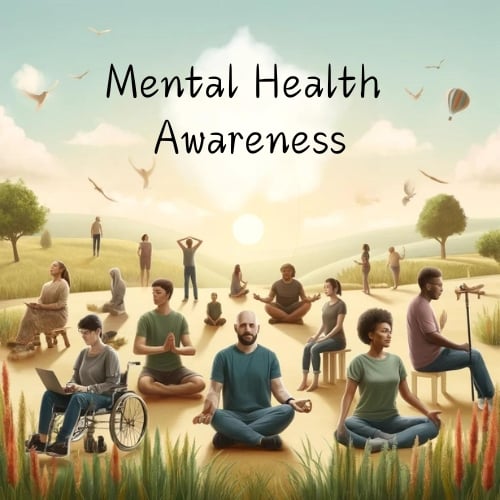Mental Health Matters: Take Action For You and Others

May is Mental Health Awareness Month, a crucial time to reflect on the importance of mental well-being and to promote understanding, empathy, and support. While we raise awareness during May, we all know that mental health and wellbeing is a year-long necessity. It’s easy to focus on individuals with significant mental health disorders and needs – we also need to recognize that each person has their own mental health and wellbeing needs.
With millions of people worldwide affected by mental health to varying degrees, it’s important to engage in meaningful actions to raise awareness and offer support. You’re already doing something by reading this article, here are five more ways to contribute to Mental Health Awareness Month:
 1. Amplify the Voices of Individuals with Lived Experience
1. Amplify the Voices of Individuals with Lived Experience
One of the most powerful ways to promote mental health awareness and understanding is by elevating the voices of individuals who have lived experience with mental health. These individuals possess valuable insights, perspectives, and stories that can challenge stereotypes, foster empathy, and inspire hope within communities.
Seek out and listen to the stories of individuals with lived experience. Attend mental health advocacy events, workshops, and storytelling sessions where people share their personal journeys of resilience, recovery, and healing. Engage with online platforms, blogs, and social media channels where individuals share their experiences and insights about living with mental illness.
It’s crucial to prioritize authenticity, respect, and sensitivity when raising up the voices of those with lived experience. Allow individuals to share their stories on their own terms, without pressure or judgment. Create spaces that encourage openness, vulnerability, and mutual support, where individuals feel empowered to speak candidly about their experiences and challenges.
Acknowledge the courage and resilience it takes to navigate a mental health journey. Advocate for policies and initiatives that prioritize the needs and rights of individuals with mental illness, ensuring their voices are heard and respected in decision-making processes. Are you “in the room” where decisions are made that impact mental health patients and clients? If so, make sure their voices are heard!
By raising the voices of individuals with lived experience, we can humanize mental health issues, break down barriers, and promote empathy and understanding within our communities. Let us recognize the strength and wisdom that comes from lived experience and work together to create a society that embraces and supports the mental health and well-being of all its members.
Check out Reduce The Stigma to hear stories from individuals with lived experience.
 2. Educate Yourself and Others
2. Educate Yourself and Others
Education serves as a powerful tool not only for personal growth but also for fostering empathy, compassion, and advocacy in the realm of mental health. Take the time to educate yourself about different mental health disorders, their symptoms, and available treatments. Understanding the complexities of conditions like depression, anxiety, bipolar disorder, and schizophrenia can help dispel myths and reduce stigma.
When embarking on the journey of self-education, it’s essential to explore a wide range of resources, including reputable websites, academic journals, books, and documentaries. Engage with diverse perspectives and voices within the mental health community to gain a comprehensive understanding of the multifaceted nature of mental illness. By deepening your knowledge, you can cultivate empathy and sensitivity toward individuals experiencing mental health challenges, paving the way for more meaningful interactions and support.
Additionally, share your knowledge with others. Start conversations with friends, family members, and colleagues about mental health. Encourage open dialogue and create a supportive environment where people feel comfortable discussing their struggles without fear of judgment. By spreading accurate information and fostering understanding, you not only combat stigma but also cultivate a community that prioritizes mental well-being and supports individuals on their journey toward healing and recovery. Through education and dialogue, we can collectively create a more compassionate and inclusive society where mental health is recognized as a fundamental aspect of overall well-being.
 3. Practice Self-Care and Encourage Others to Do the Same
3. Practice Self-Care and Encourage Others to Do the Same
Practicing self-care is not just a luxury but a fundamental aspect of maintaining good mental health, particularly when navigating life’s challenges. Prioritizing self-care involves intentionally carving out time for activities that nourish your mind, body, and spirit, fostering resilience and emotional well-being. Engage in practices such as regular exercise, meditation, journaling, or spending time in nature to cultivate a sense of calm and inner peace.
Incorporating self-care into your daily routine serves as a powerful buffer against stress and burnout, helping you recharge and rejuvenate amidst life’s demands. Whether it’s indulging in a favorite hobby, treating yourself to a relaxing bath, or simply taking a few moments to breathe deeply and center yourself, self-care rituals can replenish your energy and restore balance to your life.
Equally important is the role of community and support in promoting self-care. Encourage those around you to prioritize their well-being by checking in regularly with friends and family members, offering a listening ear, and extending empathy and understanding. Create a safe space where individuals feel comfortable expressing their feelings and seeking help if needed, free from judgment or stigma.
By fostering a culture of self-care and supportive relationships, you contribute to the cultivation of resilience and emotional well-being within your community. Encourage open dialogue about mental health and the importance of self-care, destigmatizing discussions around seeking help and prioritizing well-being. Together, we can create a more compassionate and resilient society where individuals feel empowered to prioritize their mental health and support one another on their journey toward well-being.
Check out 6 Free Nature-Based Activities for Improved Mental Health and Wellbeing
 4. Challenge Stigma and Discrimination
4. Challenge Stigma and Discrimination
Challenging stigma and discrimination surrounding mental illness is essential for creating a more inclusive and supportive society where individuals feel empowered to seek help and access the resources they need for recovery and well-being. Stigma and discrimination can manifest in various forms, from negative attitudes and stereotypes to systemic barriers that limit opportunities for individuals with mental health conditions.
When confronted with stigma, it’s crucial to speak out against harmful stereotypes and misconceptions. Challenge misinformation and stigma whenever you encounter it, whether it’s in conversations with friends and family, on social media, or in public discourse. By raising awareness about the realities of mental health disorders and sharing personal stories of resilience and recovery, you can help dismantle stigma and foster understanding and empathy.
Promoting inclusivity and equality involves advocating for the rights of individuals with mental illness in all aspects of life. Support initiatives and organizations that work to reduce discrimination in healthcare, employment, housing, and other areas of society. Advocate for policies that prioritize mental health support and accommodation, ensuring equal access to opportunities and resources for individuals with mental health conditions.
Encourage workplaces and educational institutions to implement policies and practices that prioritize mental health and create supportive environments for those in need. This may include offering mental health resources and accommodations, promoting mental health awareness and education, and fostering a culture of acceptance and support.
By challenging stigma and discrimination, you contribute to creating a more supportive and inclusive environment where everyone feels valued, respected, and empowered to prioritize their mental health. Together, we can work towards building a society that embraces diversity, promotes empathy and understanding, and provides equitable access to mental health resources and support services for all.
 5. Foster Peer Support Networks
5. Foster Peer Support Networks
Peer support networks provide invaluable emotional, social, and practical assistance to individuals facing mental health challenges. Encourage the development and expansion of peer support groups in your community, workplace, or educational institution. These groups offer a safe and non-judgmental space for individuals to share their experiences, seek advice, and receive encouragement from others who have walked similar paths.
If there are existing peer support groups in your area, consider joining or volunteering to help facilitate meetings or activities. Offer your time and support to ensure these groups remain active and accessible to those who need them. If no such groups exist, take the initiative to start one yourself or collaborate with mental health organizations to establish peer support networks tailored to specific demographics or needs, such as youth, veterans, or individuals from marginalized communities.
Peer support networks can provide a sense of belonging, validation, and hope to individuals struggling with mental health issues. By fostering these networks, you can empower people to connect with others who understand their experiences and provide mutual support on their journey toward recovery and well-being.
No matter what you do to support Mental Health Awareness Month, thank you for doing it!
Peer Support is only a click away. No matter what you’re going through, there’s a peer ready to support you.
Follow Straight Up Care

 1. Amplify the Voices of Individuals with Lived Experience
1. Amplify the Voices of Individuals with Lived Experience 2. Educate Yourself and Others
2. Educate Yourself and Others 3. Practice Self-Care and Encourage Others to Do the Same
3. Practice Self-Care and Encourage Others to Do the Same 4. Challenge Stigma and Discrimination
4. Challenge Stigma and Discrimination 5. Foster Peer Support Networks
5. Foster Peer Support Networks